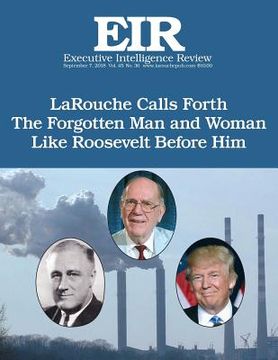Synopsis "The Forgotten Man: Executive Intelligence Review; Volume 45, Issue 36"
September 1, 2018 I want to tell you a forgotten story, the story of the fight of Franklin Roosevelt against imperialism. Imperialism by the British, imperialism by the Dutch, and imperialism by the French. FDR's vision of the peace after World War II-a peace sabotaged by the British and by their agent, Harry S Truman, who after FDR's death became President of the United States. This is an urgent topic, because the solution to the problems we're facing in the world today requires a New Bretton Woods, which Lyndon LaRouche has proposed. LaRouche's proposal is very much in line with the original conception of Bretton Woods as outlined by Franklin Roosevelt and his aide, Harry Dexter White. Throughout the decades, particularly after Nixon abandoned the Bretton Woods system on August 15, 1971, LaRouche has fought for a New Bretton Woods system. Nixon took the dollar off the gold reserve standard and introduced a floating exchange rate system-as a sharp break with FDR's Bretton Woods system. After that occurred, there was a further devolution in the world economy over the succeeding decades, and in particular in the United States' economy. That fateful decision on the part of Nixon in 1971 led to an increase in free trade policies globally, an increase in globalization in which industry took advantage of "cheap labor" in Third World nations, exploiting that "cheap labor" instead of carrying out a policy of improving the living standards of workers in the advanced sector nations, and developing the skills and living standards of individuals in the developing sector. This was the period in which the idea of a post-industrial society was introduced. Shortly after Nixon made that fateful decision, in comes the Presidency of Jimmy Carter, a project of David Rockefeller's Trilateral Commission. A key aspect of the Trilateral Commission policy was the idea of controlled disintegration of the world's productive economy. LaRouche has long fought for a restoration of the principles of the Bretton Woods system from his more advanced scientific and economic standpoint. During his Presidential campaign in 1988, he keynoted a conference in January in Andover, Massachusetts, just before the February New Hampshire primary. LaRouche's campaign that year was called the LaRouche Campaign for a New Bretton Woods-that was what he was fighting for. There was a further emphasis upon this concept, in a speech he delivered in Washington, D.C. in 1998, and then an increased emphasis in 2008. From June 2008 through November 2008, LaRouche delivered a number of speeches and wrote many articles on the necessity for a New Bretton Woods. In 1988, you still had the Soviet Union and the Warsaw Pact. There were also sovereign nation-states in western Europe. LaRouche proposed in 1988 that the initiating nations for the New Bretton Woods system should be the United States, Japan, and the Western European nations. However, after the collapse of the Soviet Union, things changed. Europe, for instance, lost its sovereignty with the imposition of the European Union and the Maastricht Treaty. The Soviet Union and the Warsaw Pact no longer existed, and there were further, positive developments with respect to China. By 2008, and perhaps even before that, LaRouche's conception was that there should be a New Bretton Woods system initiated by four powers-the United States, Russia, China, and India. And that these Four Powers had sufficient power to overrule the imperialist policies centered in the City of London. Of course, 2008 was also the year of the financial crisis which hit the world. This was LaRouche's proposal to solve that crisis.

